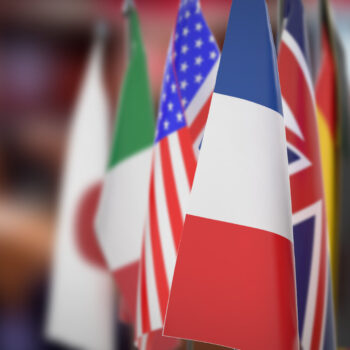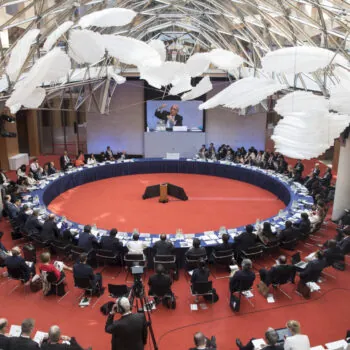The global climate change caravan hit New York but how to interpret the outcomes of the UN Secretary-General's Climate Action Summit and the protests in the street?
The UN Climate Action Summit was the first real chance to take the temperature on the global politics of climate action since the landmark Paris Climate Accord. The summit also triggered the diplomatic starting gun for the next critical set of climate decisions in Glasgow at the COP26 at the end of 2020.
Glasgow will represent a true turning point in climate action serving as a test on the effectiveness of the Paris Accord; the legal framework the world put its faith in to resolve the climate crisis. Decisions made in Glasgow will be irreversible. With so much climate pollution in the atmosphere now, if there is not a big increase in climate action at Glasgow it will be practically impossible to keep climate change within safe limits.
Many things have changed for the better since 2015. Clean energy has become cheaper than dirty coal power in much of the world. Electric vehicles have gone from an expensive oddity to an object of mainstream consumer desire. The German car makers who invented the internal combustion engine have announced their last models.
In under a year, climate strikes have grown from a single schoolgirl in Sweden to a movement of millions in over a hundred countries. Everywhere larger majorities of the public say they want more action to prevent climate damage.
The reasons for this unprecedented mobilisation are clear. Despite better technology, global greenhouse gas emissions keep rising. The impacts of climate change are hitting harder and earlier. Catastrophic damage in the Caribbean, Africa and Europe regularly capture headlines. Scientific warnings on the risks of exceeding climate thresholds have been dramatized by unprecedented glacial melting in Greenland and wildfires in the Amazon.
People are fired up for action from those with power and authority. Unfortunately, the lukewarm outcomes from the UNSG Climate Action Summit give little faith that the mercury is rising in the halls of power.
This was not due to a lack of commitment from the UN. The UN Secretary General, Antonio Guterres went far beyond the usual diplomatic niceties, only allowing leaders announcing real commitments a platform. But the response from major polluters – particularly on his demand they stop building new coal power stations – was virtually non-existent. Instead of laying a firm foundation for Glasgow, the many useful new commitments from countries and companies will not add up to a fundamental shift in the politics of climate change.
Around the Summit the question has become: if solutions are cheaper, public opinion is mobilised and impacts much clearer why is political action not following?
The battle to define and shape climate politics will rest on the answer to this question. It is vital to get this answer right. There is no time to fight the wrong political battles. It is also naïve to think facts and reason alone will eventually shape policy and power fast enough.
Some of the popular answers to this question are just incorrect. Ten companies may be responsible for most of the world’s carbon pollution, but climate change cannot be solved by a fight against big business alone. The largest polluting companies, and the vast majority of the world’s fossil fuels, are owned by countries, not capitalists. Climate change requires agreement by states not just changes by private business.
The problem is also not anymore with the deniers of climate science. Outside the US and Australia climate deniers have very little influence. The systematic sowing of scientific doubt has delayed global climate action but cannot be blamed for failure to act in the future.
The world is full of big problems which have readily available solutions; from poverty to malaria. Change fails for multiple reasons; from bureaucratic inertia to ideological resistance. Politicians delay when they fear the risks of action outweigh the risks of inaction.
But unlike climate change, failure on most issues now doesn’t stop success in the future. Climate change is unprecedented because failure now is failure forever.
All political barriers to climate change must be addressed simultaneously if action is to happen fast enough. This is no small feat. Politicians in many countries lack the confidence to act faster on climate change because they doubt the ability to deploy new technologies at scale. This is due to a number of reasons including a lack of finance, administrative capacity, local technology or public acceptance. Building confidence in the feasibility and desirability of change with international collaboration and finance is one way to help.
Around the globe owners of polluting assets – whether public or private – push back against action to squeeze out a few more years of profits. Incumbents often hide behind the risk to jobs and communities. Usually, these companies are acting tactically to slow the pace of change with no long-term resistance to climate action. Many of the worst offenders also have large investments in clean solutions.
Climate action delayers need to be convinced going slowly is no longer economically safe. Companies resisting change must face pressure to show they are fit for a low carbon world or investors will take their money elsewhere. Shareholders and savers need to use the courts to challenge bad decisions by managers of their money. Proposals like the “green new deal” can address the legitimate fears of workers that they won’t be left behind.
What goes for companies also holds true for countries. International investors need to tell countries with no credible plans to stop building dirty infrastructure that they will face higher costs of borrowing to reflect the higher risks. Government’s need to make sure taxpayers’ money is not being wasted to prop up polluting industries. Only economic pressure will make fossil dependent countries seriously diversify their economies.
Unfortunately, the UNSG Climate Action Summit showed leaders are currently distracted by many other economic, social and security problems. Some of these are of their own making – like Brexit – others are geopolitical like the US-China trade war which has driven up investment in Chinese high carbon industries to offset lost export markets. The fragmented geopolitics blocking climate action was dramatized when Trump unexpectedly swept into the UN Climate Summit but only for ten minutes so he could watch the speech of his new best friend Modi. A sustainable planet cannot be built on the shifting personal whims of global leaders.
Distracted leaders need more voices than school children’s to put climate at the top of their agenda. Major economic interests being damaged by climate change – finance, agriculture, tourism, cities, real estate – need to start making climate action their number one demand when meeting politicians. Diplomats need to understand that unless climate change is tackled effectively there will be no other geopolitics to manage. As President Macron argued at the Summit; trade relations must be designed around the priority of maintaining a stable climate not visa-versa. Why would you agree to trade freely with a country that is destroying your national climate security?
There is no silver bullet to change the politics of climate change. Action is needed in negotiating halls, legislatures, boardrooms, courts and on the streets if we are to collectively respond at the unprecedented pace needed. Political pluralism will be needed to maintain support across societies as different political parties gain power.
In most countries more people want climate action than not. Anti-climate action forces are societally weak but focused; pro-climate action forces are potentially powerful but broad and poorly organised. The problem is not so much how to raise awareness, although this is always useful, but how to align these forces so they impact the thousands of critical decisions needed to reshape our economies and societies.
Political organisation doesn’t happen through theories but through events. The UNSG Climate Action Summit didn’t deliver the action we need. Instead, it revealed the transformational change required in how we organise political action to tackle climate change.
As co-hosts of the Glasgow climate summit, the UK and Italy will need to mobilise and channel all these forces into a “whole of society” summit in 2020. This will require creativity, leadership and a willingness to take political and diplomatic risks. But these are nothing compared to the risks we are taking with our security and prosperity from a lack of climate action. Instead of turning up the heat of the planet, it’s time to fire up more climate action.
A related op-ed by CEO Nick Mabey was also published on this in Climate Home News.


